Blue light is a type of light that is emitted by electronic devices such as smartphones, laptops, and tablets. While blue light is not only harmful to the eyes, there is some evidence that suggests that exposure to blue light may have negative effects on skin health. Here are some ways that blue light may affect your skin:
-
Accelerated aging: Blue light can penetrate deep into the skin and damage collagen and elastin, which are essential for maintaining skin elasticity and firmness. Over time, this damage can lead to premature aging, including fine lines and wrinkles.
-
Hyperpigmentation: Exposure to blue light may trigger an increase in melanin production, leading to hyperpigmentation and uneven skin tone.
-
Inflammation: Blue light can also cause inflammation in the skin, which can lead to redness, irritation, and sensitivity.
-
Disruption of the sleep-wake cycle: Exposure to blue light in the evening can disrupt the body's natural sleep-wake cycle, leading to poor sleep quality. This can affect skin health by reducing the body's ability to repair and regenerate skin cells during sleep.
To protect your skin from the negative effects of blue light, it is important to limit your exposure to electronic devices, particularly in the evening. Using blue light filters or screen protectors can also help reduce your exposure to blue light. Additionally, incorporating antioxidants into your skincare routine can help protect your skin from damage caused by blue light and other environmental stressors.
The Dangers of Blue Light: Skin Damage and Aging
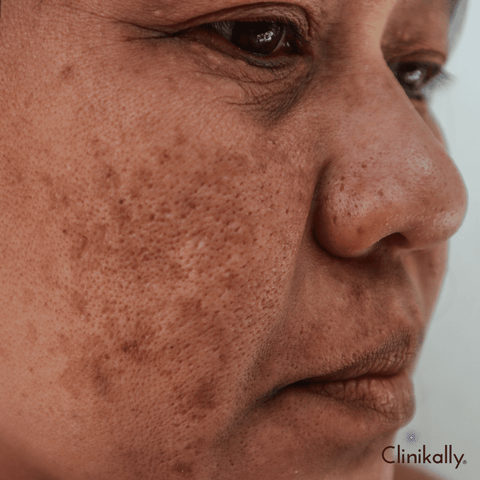
Blue light, also known as high-energy visible (HEV) light, is a type of light that is emitted by electronic devices, such as smartphones, tablets, and computer screens. While blue light is not harmful to the eyes, there is some evidence that suggests that prolonged exposure to blue light can have negative effects on skin health, including skin damage and aging.
Blue light has a shorter wavelength and higher energy than other types of visible light, allowing it to penetrate deeper into the skin. This can lead to damage to the skin's collagen and elastin, which are essential for maintaining skin elasticity and firmness. Over time, this damage can lead to premature aging, including sagging skin, fine lines and wrinkles.
In addition to skin aging, exposure to blue light can also cause hyperpigmentation and uneven skin tone. Blue light can trigger an increase in melanin production, leading to dark spots and discoloration.
Blue light can also cause inflammation in the skin, leading to redness, sensitivity, and irritation. This inflammation can exacerbate skin conditions such as acne, rosacea, and eczema.
To protect your skin from the negative effects of blue light, it is important to limit your exposure to electronic devices, particularly in the evening. Using blue light filters or screen protectors can also help reduce your exposure to blue light. Additionally, incorporating antioxidants into your skincare routine can help protect your skin from damage caused by blue light and other environmental stressors. It is also important to maintain a healthy lifestyle, including a balanced diet, regular exercise, and good sleep habits, to support overall skin health.
What is Blue Light and How Does It Affect Your Skin?
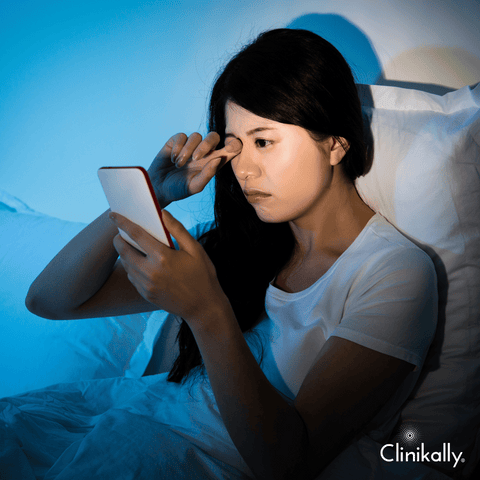
Blue light is a type of high-energy visible (HEV) light that is emitted by electronic devices, such as smartphones, tablets, and computer screens. While blue light is not harmful to the eyes, there is some evidence that suggests that prolonged exposure to blue light can have negative effects on skin health.
Blue light has a shorter wavelength and higher energy than other types of visible light, allowing it to penetrate deeper into the skin. This can lead to damage to the skin's collagen and elastin, which are essential for maintaining skin elasticity and firmness. Over time, this damage can lead to premature aging, including fine lines, wrinkles, and sagging skin.
In addition to skin aging, exposure to blue light can also cause hyperpigmentation and uneven skin tone. Blue light can trigger an increase in melanin production, leading to dark spots and discoloration.
Blue light can also cause inflammation in the skin, leading to redness, sensitivity, and irritation. This inflammation can exacerbate skin conditions such as acne, rosacea, and eczema.
To protect your skin from the negative effects of blue light, it is important to limit your exposure to electronic devices, particularly in the evening. Using blue light filters or screen protectors can also help reduce your exposure to blue light. Additionally, incorporating antioxidants into your skincare routine can help protect your skin from damage caused by blue light and other environmental stressors. It is also important to maintain a healthy lifestyle, including a balanced diet, regular exercise, and good sleep habits, to support overall skin health.
The Connection Between Blue Light and Free Radicals
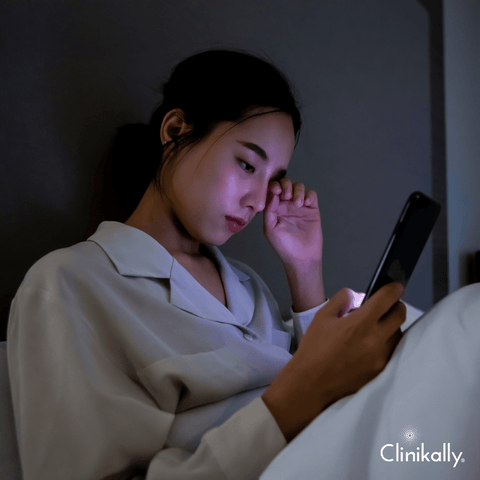
Blue light is a type of visible light with a relatively short wavelength and high energy. It is emitted by electronic devices such as smartphones, tablets, and computer screens, as well as by fluorescent and LED lights. While blue light is essential for regulating our sleep-wake cycle and promoting alertness, prolonged exposure to it can have harmful effects on our health, including the production of free radicals.
Free radicals are unstable molecules that have an unpaired electron, making them highly reactive and capable of damaging other molecules in the body. They are natural byproduct of metabolism, but they can also be generated by exposure to environmental factors such as pollution, radiation, and certain types of light, including blue light.
Studies have shown that blue light exposure can lead to an increase in the production of free radicals in the skin, which can damage skin cells and accelerate aging. This is because blue light has the ability to penetrate deep into the skin and generate reactive oxygen species (ROS), which are a type of free radical. ROS can cause cellular damage and contribute to the development of skin cancer, inflammation, and other health problems.
To protect against the harmful effects of blue light, it is important to limit exposure by taking breaks from electronic devices and using blue light filters on screens. Additionally, consuming a diet rich in antioxidants, such as fruits and vegetables, can help neutralize free radicals and reduce their damaging effects on the body.
Sun Exposure and Blue Light: A Dangerous Combination

Sun exposure and blue light can be a dangerous combination when it comes to the health of our skin. Both of these types of light can lead to the production of free radicals, which can damage skin cells and contribute to the development of skin cancer and premature aging.
When we are exposed to sunlight, we are exposed to a range of wavelengths of light, including blue light. UV rays, which are part of the sun's light spectrum, can penetrate deep into the skin and generate free radicals. Blue light, on the other hand, can also penetrate the skin and generate reactive oxygen species (ROS), which are also a type of free radical.
When our skin is exposed to both sunlight and blue light, the combination can lead to an increase in the production of free radicals, which can overwhelm the body's natural defense mechanisms and cause cellular damage. This can contribute to the development of wrinkles, fine lines, and age spots, as well as more serious skin conditions such as melanoma.
To protect against the harmful effects of sun exposure and blue light, it is important to wear sunscreen with an SPF of 30 or higher, even on cloudy days, and to limit exposure to electronic devices and other sources of blue light. Additionally, consuming a diet rich in antioxidants, such as fruits and vegetables, can help neutralize free radicals and reduce their damaging effects on the body.
The Risks of Blue Light from Computer Screens
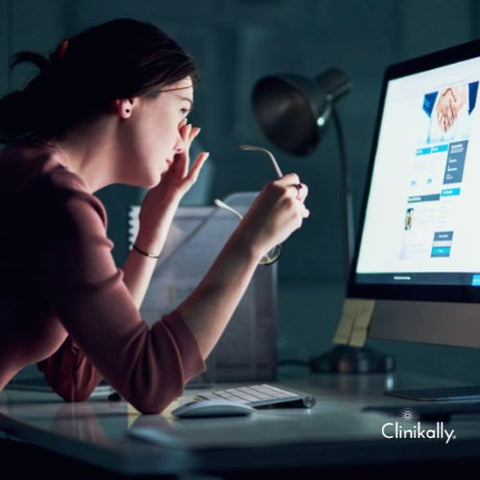
Blue light emitted from computer screens can pose several risks to our health, particularly when we spend extended periods of time in front of a computer screen. Some of the most significant risks of blue light from computer screens include:
-
Sleep disturbances: Exposure to blue light from computer screens can disrupt our natural sleep-wake cycle, making it harder to fall asleep and stay asleep. This is because blue light suppresses the production of melatonin, a hormone that helps regulate sleep.
-
Eye strain and fatigue: Staring at a computer screen for prolonged periods can cause eye strain, dry eyes, and headaches. Blue light from the screen can contribute to these symptoms, as it can cause the eyes to work harder to focus.
-
Retinal damage: There is some evidence to suggest that prolonged exposure to blue light from computer screens can damage the retina, which is the part of the eye responsible for transmitting visual information to the brain. This damage can contribute to age-related macular degeneration, a leading cause of vision loss.
-
Skin damage: As mentioned earlier, blue light from computer screens can also contribute to the production of free radicals in the skin, which can cause cellular damage and contribute to premature aging.
To reduce the risks of blue light from computer screens, it is recommended to take regular breaks, adjust the brightness and contrast settings on your screen, and consider using blue light filters or special glasses designed to block blue light.
Protecting Your Skin from Blue Light Damage

Protecting your skin from blue light damage is an important aspect of maintaining skin health. Here are some tips to help protect your skin from blue light damage:
-
Use sunscreen: Applying sunscreen with an SPF of 30 or higher can help protect your skin from the damaging effects of both UVA and UVB rays, as well as blue light.
-
Wear protective clothing: Wearing clothing that covers your skin can help protect it from blue light damage. Look for clothing with a tight weave, dark color, and UV protection rating.
-
Use blue light filters: Blue light filters can help reduce the amount of blue light that reaches your skin. Consider using blue light filters on electronic devices, or using blue light-blocking glasses.
-
Take breaks: Take frequent breaks from electronic devices and computer screens to give your eyes and skin a rest. Experts recommend the 20-20-20 rule: every 20 minutes, take a 20-second break and look at something 20 feet away.
-
Eat a healthy diet: Eating a diet rich in antioxidants can help protect your skin from free radical damage caused by blue light. Foods high in antioxidants include fruits and vegetables, nuts, and green tea.
-
Use skincare products with antioxidants: Look for skincare products that contain antioxidants such as vitamin C and E, which can help protect your skin from damage caused by free radicals.
By following these tips, you can help protect your skin from the damaging effects of blue light and maintain healthy, radiant skin.
Blue Light and Aging: Effects on Collagen and Melatonin

Blue light can contribute to the aging process of the skin by affecting collagen and melatonin levels.
Collagen is a protein that provides structure and elasticity to the skin. Blue light can damage collagen fibers by generating reactive oxygen species (ROS) that break down collagen and contribute to the formation of wrinkles and fine lines.
Melatonin is a hormone that regulates sleep and helps protect the skin from oxidative stress. Exposure to blue light at night can suppress the production of melatonin, disrupting our circadian rhythms and leading to sleep disturbances. This can contribute to skin aging, as melatonin plays a crucial role in repairing and regenerating skin cells during sleep.
In addition, blue light can contribute to the formation of dark spots and hyperpigmentation by stimulating the production of melanin, a pigment that gives color to the skin. This can lead to uneven skin tone and an overall aged appearance.
To minimize the effects of blue light on collagen and melatonin, it is important to limit exposure to electronic devices and blue light sources at night, and to use blue light filters on screens. Additionally, consuming a diet rich in antioxidants and using skincare products with antioxidants can help protect the skin from free radical damage and promote collagen synthesis. Maintaining good sleep hygiene and getting enough restful sleep can also help support melatonin production and skin repair.
How to Protect Your Skin from Blue Light Damage

Protecting your skin from blue light damage is important for maintaining overall skin health. Here are some ways to help protect your skin from blue light damage:
-
Use a screen protector: You can use a blue light screen protector on electronic devices like phones and computers. These protectors reduce the amount of blue light that reaches your skin.
-
Wear sunscreen: Sunscreen can help protect your skin from the harmful effects of blue light. Look for a broad-spectrum sunscreen with an SPF of at least 30.
-
Use blue light filtering products: Blue light filtering skincare products can help protect your skin from blue light damage. Look for products that contain antioxidants like vitamin C and E, which can help fight free radicals.
-
Take breaks from electronic devices: Take regular breaks from electronic devices to give your skin a rest. The American Academy of Dermatology recommends taking a break every 20 minutes and looking at something 20 feet away for at least 20 seconds.
-
Get enough sleep: Getting enough restful sleep can help support the production of melatonin, a hormone that helps protect the skin from free radical damage.
-
Eat a healthy diet: Eating a diet rich in antioxidants can help protect your skin from free radical damage caused by blue light. Foods high in antioxidants include berries, leafy greens, and nuts.
By following these tips, you can help protect your skin from the damaging effects of blue light and maintain healthy, radiant skin.
The Benefits of Antioxidants in Fighting Blue Light Damage
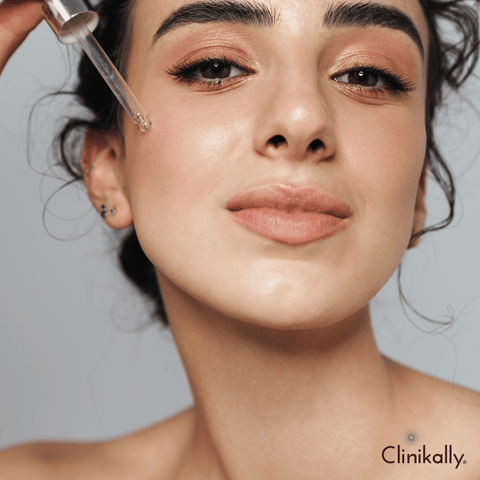
Blue light, which is emitted by electronic devices such as smartphones, laptops, and televisions, can have a damaging effect on our eyes and skin. Antioxidants can help to fight this damage by neutralizing free radicals that are produced when blue light penetrates our cells. Here are some of the benefits of antioxidants in fighting blue light damage:
-
Protecting the skin: Blue light can cause oxidative stress in the skin, which can lead to premature aging and other skin damage. Antioxidants can help to neutralize free radicals and protect the skin from this damage.
-
Improving eye health: Blue light can also cause damage to the eyes, leading to conditions such as macular degeneration and cataracts. Antioxidants like lutein and zeaxanthin can help to protect the eyes from this damage.
-
Enhancing cognitive function: Blue light exposure can disrupt our circadian rhythms, which can have negative effects on our cognitive function. Antioxidants like melatonin can help to regulate our sleep-wake cycles and improve cognitive function.
-
Supporting overall health: Antioxidants are known to have a wide range of health benefits, including reducing inflammation, supporting the immune system, and protecting against chronic diseases like cancer and heart disease.
Incorporating antioxidant-rich foods into your diet, such as fruits and vegetables, can help to provide your body with the nutrients it needs to fight blue light damage. Additionally, using products that contain antioxidants, such as skincare products, can also be beneficial in protecting your skin from blue light damage.
Blue Light and Eye Strain: The Importance of Protecting Your Skin

Blue light, which is emitted by electronic devices such as smartphones, laptops, and televisions, can have a damaging effect on our eyes and skin. Prolonged exposure to blue light can cause eye strain, dry eyes, and even affect our sleep patterns. Here are some reasons why it is important to protect your skin from blue light:
-
Blue light can cause premature aging: Blue light can penetrate deep into the skin, causing damage to collagen and elastin, which are essential proteins for maintaining skin elasticity and firmness. This can result in premature aging, such as fine lines, wrinkles, and sagging skin.
-
Blue light can cause hyperpigmentation: Exposure to blue light can also cause hyperpigmentation, which is the darkening of the skin due to an increase in melanin production. This can result in uneven skin tone and dark spots.
-
Blue light can cause inflammation: Blue light exposure can also cause inflammation in the skin, leading to redness, swelling, and irritation.
To protect your skin from blue light damage, you can take the following steps:
-
Reduce screen time: Limit your time in front of electronic devices and take breaks every 20 minutes to give your eyes and skin a rest.
-
Wear protective eyewear: Blue light blocking glasses can help to reduce the amount of blue light that enters your eyes.
-
Use skincare products with antioxidants: Antioxidants, such as vitamin C and vitamin E, can help to protect your skin from blue light damage.
-
Use a screen protector: Apply a screen protector to your electronic devices that filters out blue light.
By taking these steps to protect your skin from blue light damage, you can help to prevent premature aging, hyperpigmentation, and inflammation, and maintain healthy, youthful-looking skin.
The Connection Between Blue Light and Skin Pigmentation

Blue light, which is emitted by electronic devices such as smartphones, laptops, and televisions, can have a damaging effect on our skin. Prolonged exposure to blue light can cause skin pigmentation, which is the darkening of the skin due to an increase in melanin production. Here are some reasons why blue light can affect skin pigmentation:
-
Blue light penetrates deeper into the skin: Blue light has a shorter wavelength than other types of visible light, which means it can penetrate deeper into the skin. This can stimulate the production of melanin in the skin, resulting in hyperpigmentation.
-
Blue light can disrupt the skin's natural rhythm: Exposure to blue light can disrupt the circadian rhythm of the skin, which can affect the skin's natural repair process. This can lead to an overproduction of melanin, resulting in hyperpigmentation.
-
Blue light can cause oxidative stress: Blue light exposure can also cause oxidative stress in the skin, which can lead to inflammation and damage to skin cells. This can trigger the production of melanin, resulting in hyperpigmentation.
To protect your skin from blue light-induced pigmentation, you can take the following steps:
-
Reduce screen time: Limit your time in front of electronic devices and take breaks every 20 minutes to give your skin a rest.
-
Wear protective clothing: Wearing clothing that covers your skin, such as a hat or long sleeves, can help to reduce blue light exposure.
-
Use skincare products with antioxidants: Antioxidants, such as vitamin C and vitamin E, can help to protect your skin from blue light damage and reduce the production of melanin.
-
Use a screen protector: Apply a screen protector to your electronic devices that filters out blue light.
By taking these steps to protect your skin from blue light damage, you can help to prevent hyperpigmentation and maintain an even, radiant complexion.
Blue Light and Inflammation: How to Calm Your Skin

Blue light, which is emitted by electronic devices such as smartphones, laptops, and televisions, can have a damaging effect on our skin. Prolonged exposure to blue light can cause inflammation in the skin, leading to redness, swelling, and irritation. Here are some ways to calm your skin and reduce inflammation caused by blue light exposure:
-
Use a cool compress: Applying a cool compress to your skin can help to reduce inflammation and soothe redness and swelling.
-
Apply aloe vera: Aloe vera has anti-inflammatory properties that can help to calm and soothe irritated skin. Apply a thin layer of aloe vera gel to your skin and leave it on for 10-15 minutes before rinsing off.
-
Use skincare products with anti-inflammatory ingredients: Look for skincare products that contain ingredients like chamomile, green tea, or niacinamide, which can help to reduce inflammation and soothe irritated skin.
-
Wear protective clothing: Wearing clothing that covers your skin, such as a hat or long sleeves, can help to reduce blue light exposure and prevent inflammation.
-
Use a screen protector: Apply a screen protector to your electronic devices that filters out blue light.
-
Take breaks from electronic devices: Take breaks from electronic devices and spend time outdoors or engaging in other activities to give your skin a break.
By taking these steps to calm your skin and reduce inflammation caused by blue light exposure, you can help to maintain healthy, radiant skin.
Incorporating Blue Light Protection into Your Skincare Routine

Incorporating blue light protection into your skincare routine is an important step in protecting your skin from the harmful effects of blue light. Here are some ways to add blue light protection to your skincare routine:
-
Use skincare products with antioxidants: Antioxidants, such as vitamin C and vitamin E, can help to protect your skin from blue light damage. Look for serums, moisturizers, and sunscreens that contain these ingredients.
-
Apply sunscreen: Sunscreen is an essential step in protecting your skin from UV rays, but it can also help to protect your skin from blue light. Look for sunscreens that contain zinc oxide or titanium dioxide, which can help to filter out blue light.
-
Use a blue light-blocking screen protector: Apply a screen protector to your electronic devices that filters out blue light.
-
Wear protective clothing: Wearing clothing that covers your skin, such as a hat or long sleeves, can help to reduce blue light exposure and protect your skin.
-
Take breaks from electronic devices: Take breaks from electronic devices and spend time outdoors or engaging in other activities to give your skin a break.
By incorporating these steps into your skincare routine, you can help to protect your skin from the damaging effects of blue light and maintain healthy, radiant skin.
Taking Action: Tips for Protecting Your Skin from Blue Light Damage

Blue light, which is emitted by electronic devices such as smartphones, laptops, and televisions, can have a damaging effect on our skin. Here are some tips for protecting your skin from blue light damage:
-
Reduce screen time: Limit your time in front of electronic devices and take breaks every 20 minutes to give your skin a rest.
-
Wear protective clothing: Wearing clothing that covers your skin, such as a hat or long sleeves, can help to reduce blue light exposure and protect your skin.
-
Use a blue light-blocking screen protector: Apply a screen protector to your electronic devices that filters out blue light.
-
Use skincare products with antioxidants: Antioxidants, such as vitamin C and vitamin E, can help to protect your skin from blue light damage. Look for serums, moisturizers, and sunscreens that contain these ingredients.
-
Apply sunscreen: Sunscreen is an essential step in protecting your skin from UV rays, but it can also help to protect your skin from blue light. Look for sunscreens that contain zinc oxide or titanium dioxide, which can help to filter out blue light.
-
Take breaks from electronic devices: Take breaks from electronic devices and spend time outdoors or engaging in other activities to give your skin a break.
-
Use a blue light therapy device: Blue light therapy devices can help to reduce inflammation and improve the appearance of your skin. Look for devices that are specifically designed for at-home use.
By taking these steps to protect your skin from blue light damage, you can help to maintain healthy, radiant skin. Remember, prevention is key when it comes to protecting your skin from the damaging effects of blue light.
















